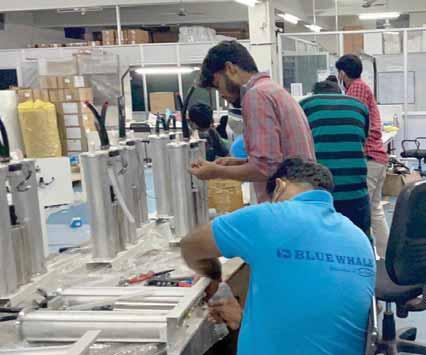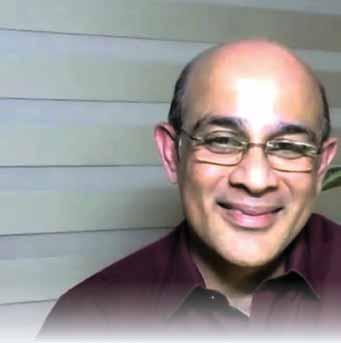
25 minute read
Calm down, isolate at home and don’t unnecessarily block hospital beds
Calm down, isolate at home and don’t unnecessarily block hospital beds Dr V Ramasubramanian

Advertisement
Rasheeda Bhagat
As the second wave of the Covid pandemic ravages India causing trauma, panic and paranoia, a voice of calm, common sense and sane medical advice is that of Dr V Ramasubramanian, a specialist of 30 years in infectious diseases. A member of the Rotary Club of Madras, he frowns on the noise and “sensationalisation” of the media, the lack of empathy in so many people who should know better. In an interview to Rotary News, the good doctor, who was seeing over 150 patients a day by May-end, said “first and foremost we all need to calm down”. Excerpts...
Why did you decide to specialise in infectious diseases?
My father is a GP; he is 90 and still practises at his clinic in Chennai. After completing an MD in general medicine from the PG Institute of Medical Education and Research in Chandigarh in 1992, I didn’t want to narrow down my focus to a single specialty such as cardiology or neurology, so I specialised in infectious diseases, which is an integral part of general medicine.
In your 30 years in the medical profession, have you ever seen a virus-inflicted pandemic such as this?
No, neither has my father! But it was inevitable, and on the cards, and not something which came out of the blue. We’ve had episodes like this starting from 1918 and we have improved tremendously in medicine but our memories are very short. We never prepare ourselves for what can happen.
Were we caught on the wrong foot; could we have handled this better?
In retrospect, we could always have done better. But in any epidemic or pandemic, any measures done beforehand seem too much, and any measures done later seem too little.
It looked as though India had handled the first wave rather well, and then like a tsunami, the second wave hit us. Did doctors like you think we are celebrating too soon?
I was always sure that the second wave would come, and had no doubt in my mind. I was the odd man out in my fraternity or field. But I expected the second wave to be milder. The numbers are higher this time, but there were many reasons for the low numbers in the first wave… difficulty in getting tests done, expensive tests and the stigma attached to anybody testing positive with boards and barricades at their homes, so people were very scared to get tested.
Also, that time, the working classes got infected, and got better in a few days, so they didn’t bother too much. I would guarantee that for every one person tested, there were at least 10 who were not tested but were positive/infected.
Was the higher cost a reason for lower testing?
Yes, even the cost — `4,000. So very few did the test initially. At that time the elderly went down; the younger ones did very well. I have counselled several people saying you’re only 30, isolate your-
self, don’t do the test and you will do well. And they’ve all done well.
But the second wave hit the more affluent, the middle classes, people working from home… they had the money, the knowledge and knew they had to take care of themselves. So anybody with an itchy throat, a slightly stuffy nose, heavy head, immediately took the test, now available and cheaper.
Are you saying the numbers reported are more now because of more tests?
Absolutely.
But the way our medical system and health infrastructure, of which we were once so proud, has crumbled is surprising. People lining up outside hospitals for oxygen, no hospital beds, people dying in Casualty. Why and how did this happen?
Even the best of places, Spain, Italy, England or even New York, went through the same experience in the first phase when they were badly hit. Now they may turn around and say the Indian government did badly. Rubbish. They were far worse during the peak of their first and second phases. I have seen pictures of their emergency departments and people falling dead on stretchers in the developed countries. They just did not have the hospital beds or facilities to cope with the numbers. I am appalled at the righteous attitude of the western world towards India because they have all gone through this. When you are equipped to handle 10 people and you get 1,000, nobody can handle it. Yes, let us accept that we have all made mistakes, and not point fingers at India. That is not only condescending but not right. Considering our population which is 10, 50 or even 100 times more than theirs, we have done reasonably well.
At least from 4 lakh our daily numbers have come down to around 2 lakh; are you optimistic that the numbers will come under control?
Absolutely! In Chennai we have already seen a decline in the outpatient load and the inpatient numbers always lag behind the OP numbers by two weeks. I am sure in two weeks the inpatient numbers will come down.
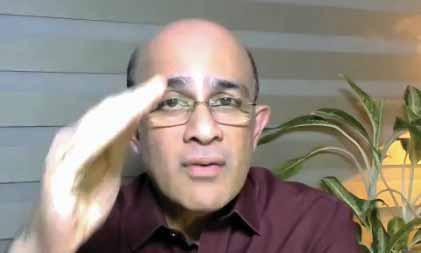
Most people with Covid can
do well if they isolate at home.
Rushing to hospitals and blocking
beds which a person with oxygen
requirement cannot access, or
refusing to vacate a bed after they
get well is the sad part.
Do you think there is more panic than warranted?
Yes, we would be reasonably better, not well off, but reasonably better, if people calmed down and understand that most people with Covid can do well if you isolate at home. Rushing to hospitals and blocking beds which a person with oxygen requirement cannot access is the sad part.
I have patients in hospitals who get well, I tell them to go home as we need the bed for somebody else and they say but today is Tuesday, an inauspicious day, or the ninth day of my admission; I can go only on the 11th day. Or I don’t have anyone to take care of me at home; I’ll be here for three more days. Depriving a bed for somebody else more deserving when you are already well is something I feel very sad about. The empathy is lacking.
So as usual the privileged corner everything?
(Smiles wryly) Everybody is equal; but some are more equal than others!
There is so much of information and misinformation floating around. What do we believe?
We are in a situation of information overload. When I was young, I had to go to a library for information
I needed. Now four taps in the comfort of your home and you can access anything you want. Add to that Whatsapp, FB and Instagram! After practising medicine for 30 years, I find it difficult to analyse and chronicle so much information. How do you think a lay person is going to process it?
Do people come and ask you all kinds of crazy questions, should they do a lung scan, a D-dimer test, etc?
(Laughs and nods his head).
Are you still seeing 100 patients a day?
More like 150 — both inpatient and outpatient in Apollo Hospitals and my clinic. But with the lockdown, in the last three days the numbers have dipped. It is sheer madness out there.
In the second wave, more people are dying; do we know why this variant/mutant is more lethal and dangerous to the lungs?
We still don’t know the entire reason, but have some hypothesis. The second variant has more mutants which are definitely more infectious than the first one. If in a household two people were infected in the first wave, this time at least 4–5 tend to get the infection. With the numbers, the mortality rate goes up too. We also know it is causing more harm to the younger people than the first time, and their mortality rate is high, but we still don’t know the reason. Is it because this time the virus is targeting people who are a little more affluent and less robust,
I don’t know!
stbecauset st etevuss targeting people who are a little more affluent and less robust,
I don’t know!
Do you see a third wave Do you see a third wave coming? coming?
Yes, it will come by the Yes, it will come by the end of this year, but I don’t know how severe it will be. know how severe it will be.
But it is inevitable and But it is inevitable and will come. will come.
And those vaccinated will be safe? And those vaccinated will be safe?
Yes, they will be safe but Yes, they will be safe but the infection cannot the infection cannot be prevented. We might see less severity, hospitalisations and death. No question about it. Infections will happen, but they will definitely be milder.
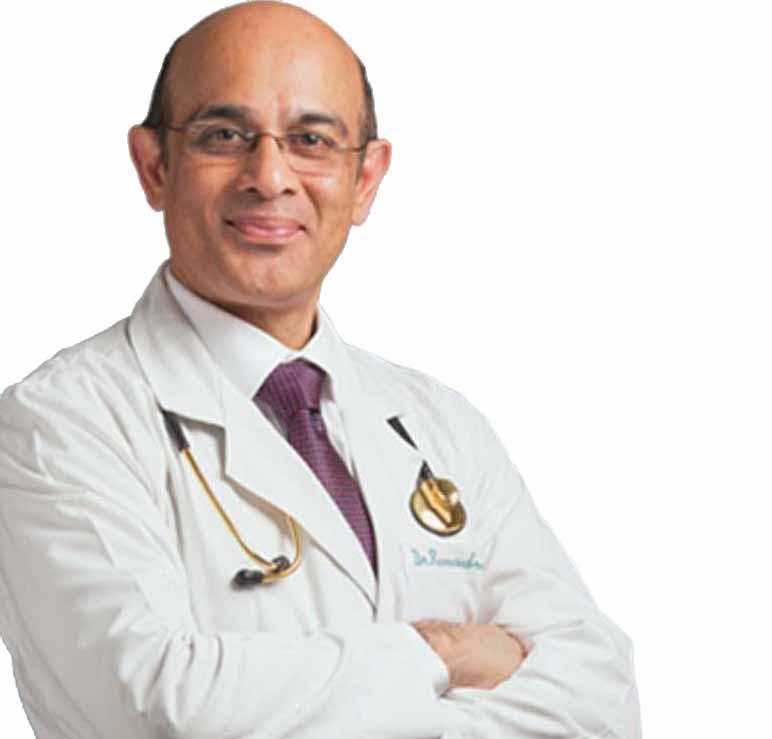
Coming to a lay person, if I have a cold cough, low-grade fever, what should I do?
The first thing to do if you suspect Covid infection is to isolate yourself. You can wait for a day or two to reassess whether you need to do a test. After the stuffy nose the first day, if you feel absolutely fine the next, I wouldn’t worry. But if you still feel feverish, lethargic, have a severe headache, backache, diarrhoea, loss of smell and appetite, then do the test. But isolate yourself first.
And if you test positive, don’t panic. Stay calm. People call me at 10 pm after testing positive, saying they need to see me immediately! You have to see the doctor the next day and let him/her decide if you need any tests. CTs and blood tests are not mandatory for everyone.
pa c.Stayca 10 pm after test they need to see You have to see day and let him need any tests. are not mandato
You, the AIIMS director and so You, the AIIM many specialists have said that the many specialis CT scan exposes you to radiation CT scan expos levels 300–400 times more than levels 300–400 that of a single x-ray. Is that so? that of a single
Absolutely. Absolutely.
So when is that indicated? So when is tha
Medically speaking, we do that for Medically speak people with persistent symptoms for people with per 7 days. If the cough is persistent or 7 days. If the co worsening, people whose oxygen worsening, peo levels are dropping slowly, if there is levels are dropp a sudden drop in saturation or pain. a sudden drop i A routine CT is not necessary; less A routine CT is than 10 per cent need it. than 10 per cen
Can there be complications after Can there be c recovery? recovery?
Almost 30–40 per cent of the Almost 30–40 p infected who recover, after two infected who re
weeks of the onset of Covid symptoms, will have some issues. Maybe something as trivial as a dry mouth, a heavy head, a little bit of a joint pain, disturbances in sleep, lack of sleep or too much of sleep. Some might have more serious symptoms such as absolute loss of appetite, tightness of chest, disabling cough, sudden loss of hair, panic attacks, inability to concentrate and work, fear and paranoia. All of these are possible. We have to treat individual cases.
Have you asked your patients to seek psychological counselling?
Absolutely; because people can’t sleep, they have paranoia. They think they will die.
How do we handle the third wave if such a rush on hospitals again occurs?
Unless we tone down the social media and the press, unless the media tones down the severity of the assault of bad news and negativity on the public, things will not improve. I keep repeating; handling the physical fallout from the infection is easier than dealing with the psychological
I am appalled at the righteous
attitude of the western world
towards India because they
have all gone through far worse
second phases. Their pointing
condescending is not right.
Five ways to stay healthy in pandemic
How important is exercise during this pandemic, to stay healthy and boost immunity, I ask Dr V Ramasubramanian, the quintessential expert in infectious diseases.
His response: Exercise is very important. Here are five ways to keep healthy and robust. * Ensure a balanced meal, veg or nonveg doesn’t matter. * Sleep and exercise: At least 6 to 8 hours of sleep every night.
And half-an-hour of physical activity five times a week, with a minimum of 90 minutes a week in any game or sport, walking, cycling, swimming, whatever. * Alcohol and smoking: Avoid smoking, alcohol in moderation…less than 7 units a week. * Reduction in stress. This is the most important factor. * Vaccination: Non-Covid times it is flu, tetanus, etc. During Covid times take the Covid vaccine. It will keep you safe and healthy.
issues. If patients insist on getting admitted when there is a lack of beds, how do doctors convince them they don’t need hospitalisation? It is very difficult.
What kind of food does one take during and after this infection?
Doesn’t matter. Food plays the least role in Covid, it just needs to be a balanced, nutritious diet; vegetarian or non-vegetarian.
Which vaccine?
Whichever is available. All of them are safe and found to be effective.
How do we deal with the fear of blood clots?
Any intervention, be it just a paracetamol, has side-effects. The question is what are the chances. When you drive on the road can’t you die or get a head injury in an accident? You can. Does that prevent you from travelling on the road and just staying at home? No. So this is also like that. You have to weigh the benefits and the risks. To me the benefits far outweigh the risks.
What is the window of safety after taking a vaccine shot?
Two weeks after the second dose. First dose doesn’t do much.
The interval between two jabs? For Covaxin it is 4 weeks, and Covishield at least 12 weeks.
Will a booster dose be required after a year or so?
Let’s wait and see. Probably it will be like flu where you will need annual shots but no data is yet available.
What do you feel about the fantastic claims made by different kinds of medicine promising wonder cures for Covid in the background of the controversy between the IMA and a yoga guru?
I have a healthy regard for alternative systems of medicine. There are situations where homeopathy is better, or Ayurveda, no question about it. But I only wish they had a little more scientific rationale in analysing and coming to a conclusion. You can’t just say I have given this to 50 patients; they all survived and hence it is working.
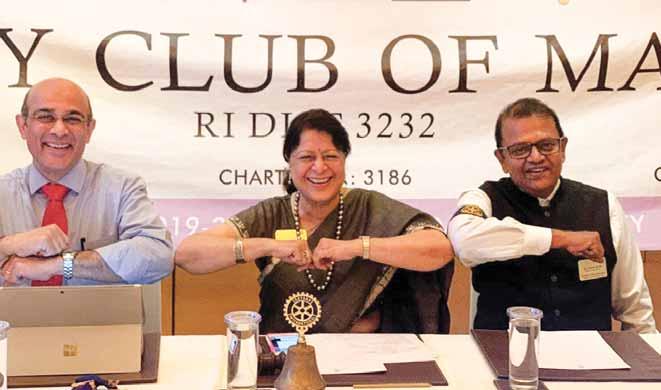
Dr V Ramasubramanian, at a meeting of RC Madras, with former club president Dr Vijaya Bharathi.
No, there should be some scientific analysis. The fact is that they have survived for centuries, which means they have made effective interventions.
Do they help in treating infectious diseases?
Oh yes, they do, but usually for acute situations, allopathy is better. This is my feeling.
You are a Rotarian, what do you feel about the way Rotary,
I have a healthy regard for
alternative systems of medicine.
But I only wish they had a
in analysing and coming to a
conclusion.
and the larger community has responded… with so much of kindness and generosity during this pandemic?
Despite criticising the media for creating panic, I have phenomenal faith in human beings. Both Rotary and the larger community have rallied around splendidly, giving oxygen concentrators, trying to get beds for people, running vaccination camps. On similar lines we need to tone down the panic and this is the best thing the media can do.
Coming to Rotary, it is making a huge difference in the lives of so many people, earlier and now during this pandemic. Whether it is helping somebody to survive, or feel better… showing empathy which is so important, and getting a warm glow which only helping others can bring. Rotary is a fantastic organisation, so well organised and regulated. I am proud to be a Rotarian.
I know you’re really working long hours. What does your day look like?
(Smiles) I get up at 5.30 am, go to my clinic (Capstone Clinic, a multispecialty clinic he initiated) at 7 am, leave it at 9, reach Apollo Hospitals (Greams Road) by 10.15 am, where I attend to both OP and inpatients, return to my clinic at 3.30 pm and work there till 7 pm. So it is 12 straight hours of work. And then in the evening I talk to people like you, attend Zoom calls, meetings, committee meetings, print and electronic media interviews, Insta and FB chats… all that goes on.
How do you get your exercise?
Physical exercise is not a problem at all. I clock at least 10,000 steps a day walking around the hospital. I am exhausted when I finish for the day, and within 5 seconds fall asleep until the alarm wakes me up. I also do yoga thrice a week, each session being 45 minutes.
Fighting Covid is our priority
Ashok Mahajan
On one hand, we receive daily news of the havoc being caused by the Covid-19 virus. At the same time, it is heartening to see that Rotarians across India have come to the forefront of the battle against the dreaded virus. Take a look at the great work done by Rotary in the last few months.
Free vaccination centres have been established in many states; oxygen plants have been set up in hospitals; oxygen concentrators are being provided; plasma supplies are being coordinated; and call centres have been set up to provide accurate information and ensure coordination of Covid relief work.
RC Madras was the first to enter into an agreement with the Tamil Nadu government to partner in the Covid relief work including vaccination. The club donated four refrigerated trucks and other cold chain logistic facilities, all costing over `1 crore, to the state government for vaccine transportation. Along with the Chennai Corporation, it also organised nine camps over two days across the city, vaccinating 3,000 people free of cost. I congratulate the club president, secretary and other office bearers for their yeoman service.
RC Ujjain has established a 100-bed quarantine centre in Prashanti Garden which belongs to Rtn. Avanish Gupta. Many Rotarians have helped in this wonderful project which was dedicated to the community by the Education Minister of Madhya Pradesh in end-April.
In Delhi, DG Sanjiv Rai Mehra had committed to install 10 oxygen plants in hospitals and one single club alone, RC Delhi Premier, installed seven plants in seven hospitals within two weeks. This `2 crore project will benefit hundreds of patients immediately.
I congratulate and salute district and club leaders for their exemplary leadership during this national crisis.
Various factors, including a surge in number of cases, has resulted in shortage of medical oxygen in hospitals across the country. With just over 1,200 cryogenic tankers available for transport of liquid medical oxygen, today we need oxygen concentrators to reach every hospital and nursing home.
The GoI has reduced the GST on oxygen concentrators to 12 per cent till end-June and waived Customs duty. Custom clearance will be granted for such imports by treating them on par with life- saving drugs. I request every Rotary leader to talk to their batchmates and sister clubs overseas and co-ordinate the shipment of oxygen concentrators to India. Rotary clubs must be able to fund this life- saving equipment by approaching philanthropists in their community and other organisations.
As vaccine supplies get restored to adequate levels, we must gear up to ensure that the communities that we live in become safer. There is a genuine concern that the virus may infect the younger population. The safety net of vaccination needs to spread far and wide to cover as many people as possible, as fast as possible.
I request every Rotary leader
to talk to their batchmates
and sister clubs overseas and
co-ordinate the shipment of
oxygen concentrators to India.
The writer is a past Rotary International director and chairman, Rotary India’s Covid Task Force.
RC Madras donates equipment worth `1.1 crore for Covid vaccination
V Muthukumaran
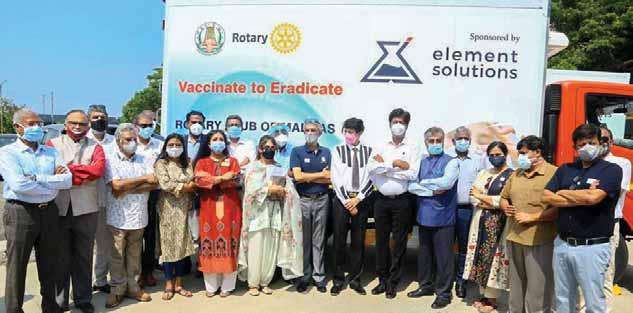
RC Madras president Kapil Chitale along with RIDE A S Venkatesh, TN health secretary Dr J Radhakrishnan (centre), former IT secretary Vivek Harinarain (5th from right) and TN public health director Dr T S Selvavinayagam (4th from right) at the hand-over of cold chain equipment for Covid vaccination.
As part of its support initiatives for the Tamil Nadu government’s ongoing Covid vaccination programme, after being chosen as the nodal club in this endeavour, RC Madras, RID 3232, donated a slew of cold chain logistic facilities worth $150,000 (over `1.1 crore) to the State Department of Public Health and Hygiene.
The facilities include two14-feet-long refrigerated trucks with a total capacity to transport 44 lakh doses from the central vaccine storage facility to the zonal vaccine stores; two 8-feet refrigerated trucks that can transport 20 lakh doses from the zonal stores to the district stores; 15 ice-lined refrigerators that can store 10 lakh doses of vaccines in the district stores; five deep freezers; and 1,000 vaccine carriers (box type) that can be used to vaccinate up to 30 lakh people each time.
RIDE A S Venkatesh presented the keys of the cold chain facilities to the TN health secretary J Radhakrishnan in the presence of state public health director Dr T S Selvavinayagam, club president Kapil Chitale, secretary P B Prasad, project chair Dr Gautamadas Udupi, co-chair A M Vishwanathan, special projects director S Balakrishna and medical officials. The hand-over ceremony was held at the Government Multi Super Speciality Hospital, Omandurar Estate.
Speaking on the occasion, Venkatesh said, “all the 35,000-plus Rotarians in Tamil Nadu are ready to provide all necessary help, and donate equipment to the government to meet the
Along with polio, once again in 1995, Rotary helped us in our hepatitis-B vaccination drive and now it is filling the infrastructure gaps, especially in ensuring cold chain networks.
J Radhakrishnan
TN Health Secretary.
complete needs of the cold chain infrastructure and other facilities for vaccinating the people in the fight against this pandemic.”
Over the last 35 years, the 92-year-old club has taken the lead in polio eradication in this part of the world; and now it is providing delivery trucks and vaccine carriers for the “last mile reach to inoculate every single people of the state,” he added.
Venkatesh gave citations to five major sponsors — Cookson India, SRF, Vinayaka Missions Hospital and Research, Godrej Boyce and RC Madhavaram – and 15 smaller sponsors including club members and RC Chennai IT City.
Club president Chitale said that the club will be launching a mobile vaccine unit (MVU) in collaboration with the Apollo Hospitals to provide vaccination to
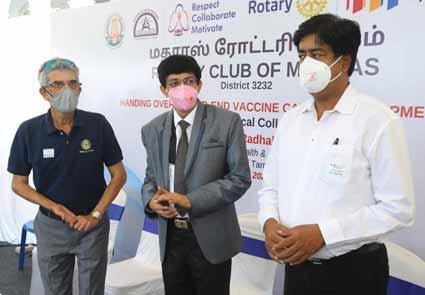
From L: Club president Chitale, TN health secretary J Radhakrishnan and RIDE Venkatesh.
people in remote hamlets and areas where there is no primary health centre or any medical facilities. The club will also join hands with the Sundaram Medical Foundation to roll out vaccine-related programmes such as creating awareness on vaccination.
The Covid trucks were custom-built so that its interiors can maintain the required constant temperature in the range of 2–8 degree Celsius to ensure the vaccine’s potency, said Dr Gautamadas speaking to Rotary News.
Referring to the Union health minister Harsh Vardhan’s statement that the GoI is expected to receive 400–500 million vaccine doses to cover around 20–25 crore people by July 2021, the project chairman said the
Centre has directed states to make a robust plan for vaccine storage and distribution by Oct 15.
The task of securing
‘end-to-end connectivity’ — from the time the vaccine is received from the manufacturer at the central vaccine store, Chennai, till it is received at the point of administration in cities, towns and villages — and ensuring that nothing goes wrong before the shot is administered is very important. Only this will ensure the success of the vaccine programme, he said.
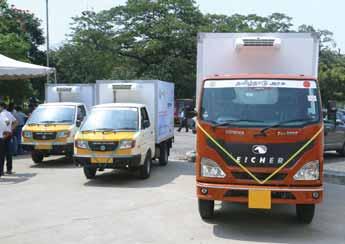
A big ‘thank you’ Recalling the eventful relationship with Rotary since 1985 when the state had partnered with it for the Pulse Polio campaign, Radhakrishnan expressed a ‘big thank you’ for all the health-related service extended by Rotary clubs in Tamil Nadu. “Along with polio, once again in 1995, Rotary helped us in our hepatitis-B vaccination drive and now it is filling the infrastructure gaps, especially in ensuring cold chain networks,” he said.
Coimbatore Rotarians shore up healthcare facilities
Jaishree
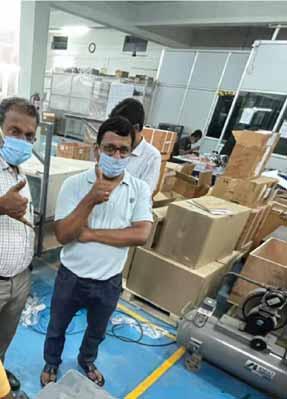
In its fight against the second wave of Covid, Coimbatore hospitals faced severe oxygen shortage following a high influx of patients in need of oxygen.
Dr A Nirmala, dean of the Coimbatore Medical College and Hospital (CMCH), made a desperate call to Dr Balavenkat, senior consultant-anaesthesiologist, Ganga Hospital, Coimbatore, seeking support. The Rotarian, a member of RC Coimbatore, immediately circulated a video among Rotary, Round Table and other organisations with an appeal to help. “In the next 48 hours we had `2.4 crore in our kitty!” he says. Rotary clubs of Coimbatore pooled in `1 crore and Dr Rajesh and Dr Nitya, alumni of CMCH, raised a similar amount from the US. Funds are still pouring in and are being used for various Covid-related activities, he adds.
This money helped in setting up four oxygen plants in the GH and three in the ESI Hospital in Coimbatore. Each of these plants, costing `27 lakh, can generate 100 litres of oxygen per minute.
“It is all a joint effort. Boundaries have blurred and all clubs are huddling up together for service at this critical time,” says Chella Raghavendra, member of RC Coimbatore Spectrum, RID 3201. The club placed orders for two plants to be installed at the CMCH and RC Coimbatore East pitched in with one more. Each of these plants will provide piped oxygen to 20 beds simultaneously. Additionally, RC Coimbatore Satellite, along with Aquasub Pumps, installed a high-flow oxygen plant at the CMCH. It can fill up 72 cylinders a day and thus support another 40 beds there.
Vivekanandan, a member of RC Coimbatore North, arranged to supply these machines within a week through his company, Faraday Ozone. “He slashed his prices and even put on hold his export orders to meet our emergency need.” RC Coimbatore Spectrum roped in an NGO from Taiwan to provide 200 oxygen concentrators. “We will give them to the district collector to be installed at PHCs which have been
Rotarians overseeing the manufacture and testing of oxygen concentrators at an assembling unit.
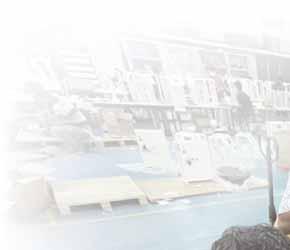
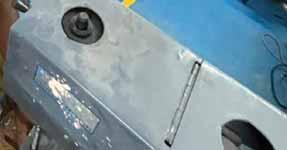
converted as Covid care centres,” says Raghavendra.
Project Sanjeevani
Rotary India’s Covid Task Force zone coordinator Sunil Zacharia called an online meeting with DG Jose Chacko, assistant governors and district directors to extend relief on a war-footing. “‘If we Rotarians do not act now it is a crime,’ he said and this made a strong impact,” says district director R S Maruti. Rotarians from the city’s 41 Rotary clubs immediately formed a Covid Action team called G41 to extend support to the public, hospitals and frontline workers through what they termed Project Sanjeevani. Volunteers from the clubs were put on its committee, led by Maruti and district chair — community services P P Lakshmanan. “We pooled in resources from each club and categorised them under headings — doctors/ hospitals and nursing homes, medical equipment, catering and ambulance services. This helped in speedy contact whenever needed,” he says.
Chacko formulated a 20-point agenda which was channelised into three verticals in consultation with DGE Rajasekhar, PDG A V Pathy, Raghavendra and AGs. These dealt with providing vaccination for Rotarians, their families and employees and Rotaractors; advocacy through digital and print media; and providing required equipment to government and private hospitals and PHCs. Popular You Tubers, influencers and Annets were roped in for its promotion. Rotaractors led by DRR Janani are working closely with the team in helping the public with online registration for vaccination, setting up online help desks and a Covid war room that can respond to queries from the public and doctors.
“We will soon provide seven machines to the ESI Hospital,” says Maruti. The hospital has increased its beds from 600 to 1,000 to treat Covid patients and hence the acute oxygen shortage. RC Coimbatore Sai City, in partnership with Coromondal Fertilisers, Chennai, has provided oxygen concentrators worth `50 lakh to the GH in Ooty and medical support worth `3.5 lakh to the CMCH..
Recently the G41 team received a request from the CMCH and ESI Hospital for RTPCR testing machines and other basic medical equipment which will be provided. Along with manpower acquired through Rotarians who run HR agencies, the team has rented 33 autorickshaws for use in PHCs during the lockdown. The rent, `10,000 for each autorickshaw, is borne by the clubs. The clubs are also taking care of consumable requirements such as masks, sanitisers, oximeters, gloves and PPE kits at the PHCs and hospitals.
Rotary clubs of Coimbatore will be providing oxygen assistance for a total 180 beds in the CMCH and 260 beds in the ESI hospital, says Maruti, adding that three clubs — RCs Coimbatore Uptown, D’elite and Greencity — are together sponsoring an ECMO machine worth `40 lakh for CMCH.
Several Rotarians are working with CSR partners and friends abroad to extend support to hospitals in Coimbatore. “Even the local community is involved. Recently one Rangaraj called me and said that he had heard about our work and wished to donate `1 lakh. Funds are pouring in and we are coordinating with clubs that have FCRA-registered accounts to bring in foreign funds,” he smiles. Business forums such as CII, SITRA and CAI have also shown interest to channelise their contribution through Rotary.
The Rotarians are also helping critically-ill patients get hospital admission. “One such patient, who I got a bed after nine hours’ coordination, told me that the first thing he wants to do after he recovers is join Rotary!” says Maruti, adding, “once this crisis is behind us, we all will have powerful stories to relate.”
